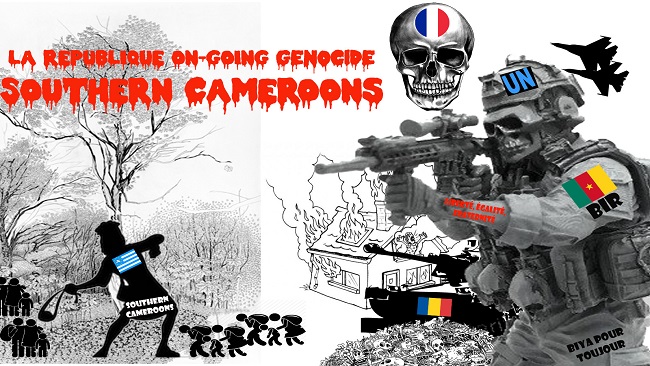Education in Crisis in the Federal Republic of Ambazonia
The Anglophone regions of Cameroon have since late 2016 witnessed a sociopolitical crisis which has deteriorated overtime and led to violent clashes between armed forces, loss of lives and property, internal displacement and a growing climate of fear and incertitude. The current crisis has its roots in grievances which date back to the early 1960s. Recent events have led to the escalation of violence and armed confrontations between government forces and Non-State Armed Groups (NSAGs). Much of this violence is targeted at local communities and, in particular, at schools, with pupils and teachers frequently facing attacks. The atrocities that have been perpetrated during these attacks have directly affected the areas in which SODEI works and operates. Schools have been regularly attacked by armed groups, and tragically this has led to the loss of lives and the horrific traumatisation of many children and teachers.
NSAGs fighting the government adopted a school boycott/disruption strategy since 2017 to apply pressure on government. This was accompanied by Monday ‘ghost-towns’ and other spontaneous calls for ‘lockdowns’, especially on commemorated national days, sometimes lasting for several days. The school boycott strategy has had a severe impact on children’s ability to attend school and learn. Currently, there is disagreement as to whether there has been a shift from the boycott strategy. There have been no formal declarations from recognized non-state actors or groups involved. Calls for a return to normal functioning of schools from some individual actors have been challenged by other individual actors and groups. Meanwhile, schools and school pupils/students have continued to be subjects of attack and violence as of November 2020. Defiance of calls for school boycott and other lockdown measures have led to repercussions. Students, teachers, and infrastructures of schools accused of ‘violating the boycott’ have been targeted. In addition, confrontations between NSAGs and state security forces around the vicinity of schools have sometimes led to casualties and caused trauma to pupils and students. Such instances have led to the suspension of school activities for several weeks, affecting many schools within the vicinity of the confrontation and beyond. This has caused many to question the presence of security forces around schools as a security measure.
In addition to the threat of or direct acts of violence leading to school disruptions, other factors such as social media misinformation, false alarms and panic have led to the further disruption of school activities. The response from the Cameroonian government and external international institutions to the school crisis have been questioned. Many have blamed the government for not living up to its commitments to ensure a conducive learning environment, despite endorsing the Safe Schools Declaration in September 2018. UNICEF reported that as of January 2020, nearly 900,000 children in the Northwest and Southwest regions of Cameroon are impacted by the crisis and in accessing education. On its part, the reaction by the international community has not been robust enough in terms of condemnation and action to ensure that the right to education is upheld. The Norwegian Refugee Council has referred to the crisis in Cameroon as one of the most neglected in the world. This research seeks to identify and provide an overview of all the converging factors leading to disruption of school activities, outline a timeline of school attacks, and provide an educational needs assessment for children of school going age in the Anglophone regions. It provides a brief background to what is now known as the Anglophone crisis, a timeline on attacks in schools and other factors including, social media misinformation, false alarms and panic, leading to further disruption of school activities. The report also captures the wider sociopolitical context and events that have a direct or indirect impact on the school crisis in the Anglophone regions, including national celebrations, the 2018 presidential and municipal elections, the impact of COVID-19, the Boko Haram crisis in the North, and the crisis in Central African Republic, which has spillover effects into the country. The report includes an educational needs assessment for the affected Anglophone regions and establishes that because of the violence and disruption, many have sought educational alternatives through informal learning methods, as well as relocating to neighbouring towns in the French-speaking parts of the country, or to other relatively safe urban areas of the Anglophone regions. The report primarily relies on secondary research, focusing on scholarly articles, relevant articles from reputable and unbiased news sources, press releases and other reports from Non-Governmental Organisations (NGOs).
SODEI exists to champion and empower children and young people through extending educational opportunities, encouraging civic engagement and nurturing youth participation. We believe unconditionally in the rights of children and young people to self-expression, equal opportunities and, most importantly, access to education. Furthermore, we believe in the importance of education as a universal right not only to improve and protect the lives of young people, but also to increase.
Culled from Reliefweb





